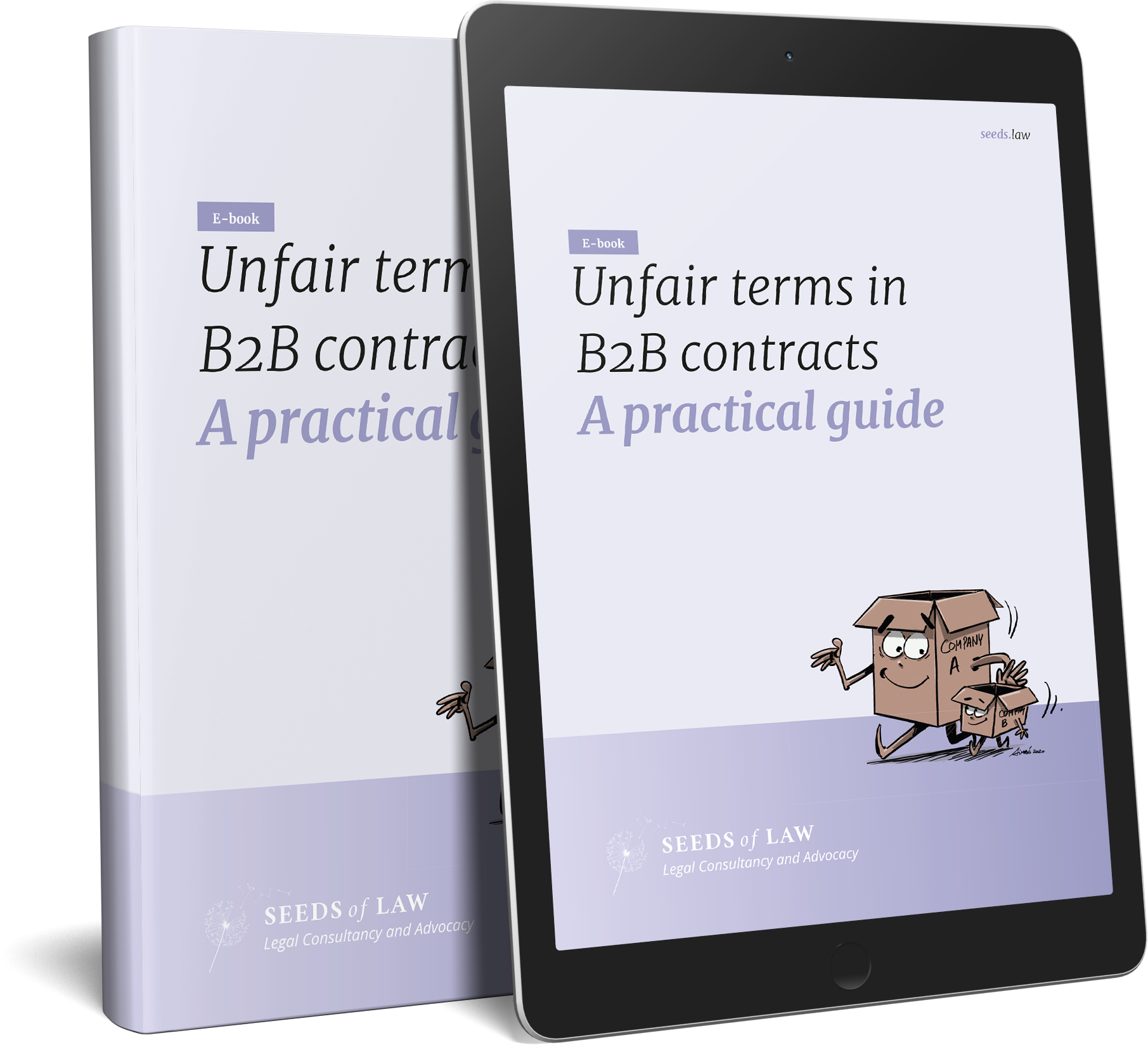- Commercial and Economic Law
- Steve Griess
- B2B , B2B law , franchising , franchisee , franchisor , manifest imbalance , differentiated balance of power
As the B2B law is specifically adopted with a focus on the situation of franchisees who could sometimes be faced with unfair terms and conditions, franchise contracts are therefore in the middle of the debate in respect of this new law.
Hence, it is important to examine the clauses that may create a "manifest imbalance" between the rights and obligations of the parties to a franchise agreement.
Franchising is a method to expand renowned and structured brands. It is currently booming in various sectors, such as the hotel and restaurant sector, retail and real estate.
The specific nature of the relationship between the franchisor and the franchisee will, without any doubt, give rise to the application of the B2B law prohibiting unfair terms between businesses.
The franchisor and the franchisee will therefore have to be particularly attentive when drafting their collaboration contract in order to avoid being sanctioned.
1. What is franchising and why is it specifically concerned by the B2B law?
Franchising is a formula that involves the collaboration between two independent traders whereby the franchisor will allow the franchisee to operate a successful brand and to become part of its network of sales points.
The franchisor will have to (i) transmit its know-how to the franchisee, and (ii) to provide commercial and technical assistance before launching the business and, during the exploitation, on a continuous basis.
For his part, the franchisee must (i) pay the franchisor for both his know-how and his assistance, generally in the form of a percentage of the turnover achieved, and he must (ii) operate the business in strict compliance with the rules of the franchise network.
This win-win formula makes it easier for the franchisor to extend its network territorially and for the franchisee to benefit from the expertise and renown of a tested concept.
If franchising is a business typically targeted by the new B2B regulations, it is because it brings together a "strong" party and a party considered as "weaker" who may set up a contractual relationship in which this differentiated balance of power is reflected.
Moreover, during the debates that took place in the run-up to the new B2B law, specific attention was paid to the franchise agreement. It was stated that the regulation adopted was aimed precisely to deal with the situation of franchisees who could sometimes be confronted with unfair general conditions, restricting their economic freedom.
Caution is therefore required. In other words, it is important to be very vigilant with regard to your franchise contracts!
2. What are the classic clauses of the franchise contract that could be problematic?
Most - if not all - franchise contracts may contain clauses that potentially create a "manifest imbalance" between the rights and obligations of the parties, which is the criterion to consider a provision as unfair.
The following rather common clauses may be affected by the B2B law:
- While it is sufficiently known that the franchisor can never impose a minimum resale price to its franchisee, it is common for the franchisor to reserve the right to set a maximum resale price or to recommend to its franchisee the application of predetermined resale prices;
- Clauses authorising the franchisor to unilaterally modify the system of the network, with the obligation for the franchisee to adapt his business and, within a certain period of time, to adapt the new decisions taken;
- Provisions obliging the franchisee to purchase its products from suppliers chosen by the franchisor or from wholesalers who have received prior approval from the franchisor. Similarly, clauses that would allow the franchisor to require the franchisee to change suppliers at its sole discretion would also be open to discussion;
- Clauses requiring franchisees to make periodic investments (such as a remodelling of the business) or allowing the franchisor to require franchisees to contribute to common network costs (such as marketing policy or targeted advertising);
- Clauses imposing the franchisee to comply at all times with the standards and franchise manual issued by the franchisor;
- Clauses authorising the franchisor to unilaterally change the price, features or conditions of the franchise agreement without a valid reason.
These traditional clauses will henceforth have to be examined on a case-by-case basis to assess whether or not they should be deemed unfair.
3. What specifically should be taken into account when determining whether a clause is unfair?
Hasty conclusions however should not be drawn. Not all the traditional terms set out above will automatically become unfair terms.
The unfairness of a contractual term must be assessed on a case-by-case basis, taking into account a number of factors such as the circumstances surrounding the conclusion of each particular contract and the usages of each commercial formula chosen.
The concrete elements of assessment which could counterbalance the strict application of the principles of the new regulation will have a very important dimension in the context of the franchise relationship, in particular in the following cases and for the following reasons:
- The franchisee will necessarily have to be aware of all the legal and economic conditions of the franchise network before making the decision to become a franchisee. The franchisor is obliged to provide him with a pre-contractual disclosure document, at least one month before the conclusion of the franchise agreement.
The purpose of this mandatory and strictly regulated pre-contractual information is precisely to re-establish a certain balance between the parties and to enable the franchisee to be sufficiently aware of the rights and obligations arising from the contract and of the history, the status and the prospects of the market in which the activities are carried out. - It has long been an accepted practice in this sector that a franchisee’s economic freedom may be somewhat restricted in return for the franchisor's long-term efforts to achieve a "tested and endorsed" system.
- Supply clauses towards specific suppliers as well as clauses of strict compliance with the franchised system could be considered as indispensable elements for the success of a franchise system and could be justified in order to maintain a uniform image of the franchise network. Moreover, such provisions are of a nature to ensure an equivalent level of quality to the consumer between all sales points of the franchise system, which is, after all, the ultimate objective of a franchise system.
- It should be remembered that several clauses will not be considered unfair provided that they can be justified by a "valid reason" (such as clauses allowing unilateral changes in conditions). In the context of franchising, a "valid reason" is the franchisor's mission to evolve its concept so that it continues to meet the ever-changing expectations of its customers.
Similarly, the fact that consumers expect a homogeneous network and that favorable economic conditions have been negotiated in the specific interest of all the franchisees could be considered as a valid reason for imposing approved suppliers.
Therefore, particular attention should be paid each time when the interest of a potentially problematic clause in a specific situation must be assessed. Such clauses will have to be drafted in a sufficiently complete and precise manner such that it can be concluded that the principles enclosed are deemed to be necessary and reasonable for the performance of a franchise relationship that is beneficial to both parties.
As part of this very important preventive work, the experience of our firm's practitioners allow to audit franchise agreements, and possibly to propose improvements in order to bring your clauses in line with these new regulations. This will prevent your business from being confronted with questions about the validity of its contracts.
We are therefore at your entire disposal to assist and advise you in the revision or drafting of your franchise contracts, ensuring that they comply fully with the law on unfair B2B clauses. Please contact us via info@seeds.law.
Would you like to stay up to date with our latest news? Then follow our LinkedIn page.
False Read alsoDiscover our e-book about unfair terms in B2B contracts
In our e-book “Unfair terms in B2B contracts” you will discover a number of interesting tips to familiarize yourself with the new principles of the B2B law.





